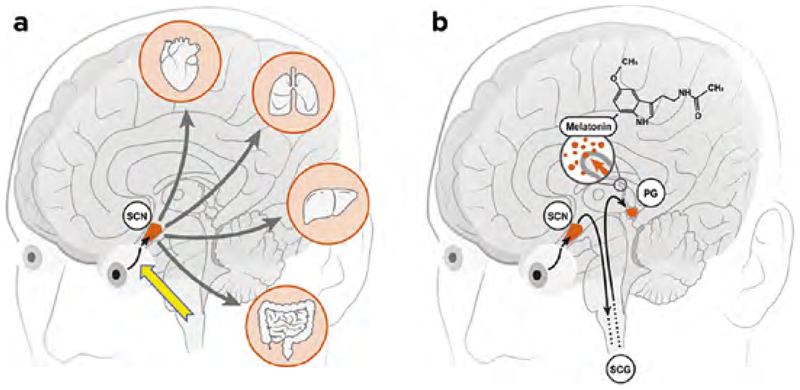Wie die Lichtwahrnehmung unsere innere Uhr beeinflusst: (How photoreception affects our inner clock).
Zeitschrift fur praktische Augenheilkunde & augenarztliche Fortbildung : ZPA
Pub Date : 2023-07-01
引用次数: 0
Abstract
In addition to the rods and cones, the melanopsin-containing intrinsically photosensitive retinal ganglion cells (ipRGC) are responsible for encoding ambient illumination conditions. The main task of the ipRGC is to signal information about illumination to the brain. Via the retinohypothalamic pathway, light synchronises our internal biological clock and sets it to follow the environment's light-dark cycle. Light is the most important zeitgeber for our inner clock and the ipRGC are therefore highly important for the field of chronobiology. Many ocular and retinal functions also follow a diurnal rhythm. Chrono-ophthalmology is an emerging research field at the interface between the eye and the clock.

光感受器如何影响我们的内在时钟。
除了视杆细胞和视锥细胞外,含有黑视素的内在光敏视网膜神经节细胞(ipRGC)负责编码环境光照条件。ipRGC的主要任务是向大脑发送有关照明的信号。通过视网膜下丘脑通路,光与我们体内的生物钟同步,并使其跟随环境的光暗循环。光是我们体内生物钟最重要的授时因子,因此ipRGC对时间生物学领域非常重要。许多眼部和视网膜功能也遵循昼夜节律。时间眼科学是一个新兴的研究领域,在眼睛和时钟之间的界面。
本文章由计算机程序翻译,如有差异,请以英文原文为准。
求助全文
约1分钟内获得全文
求助全文

 求助内容:
求助内容: 应助结果提醒方式:
应助结果提醒方式:


